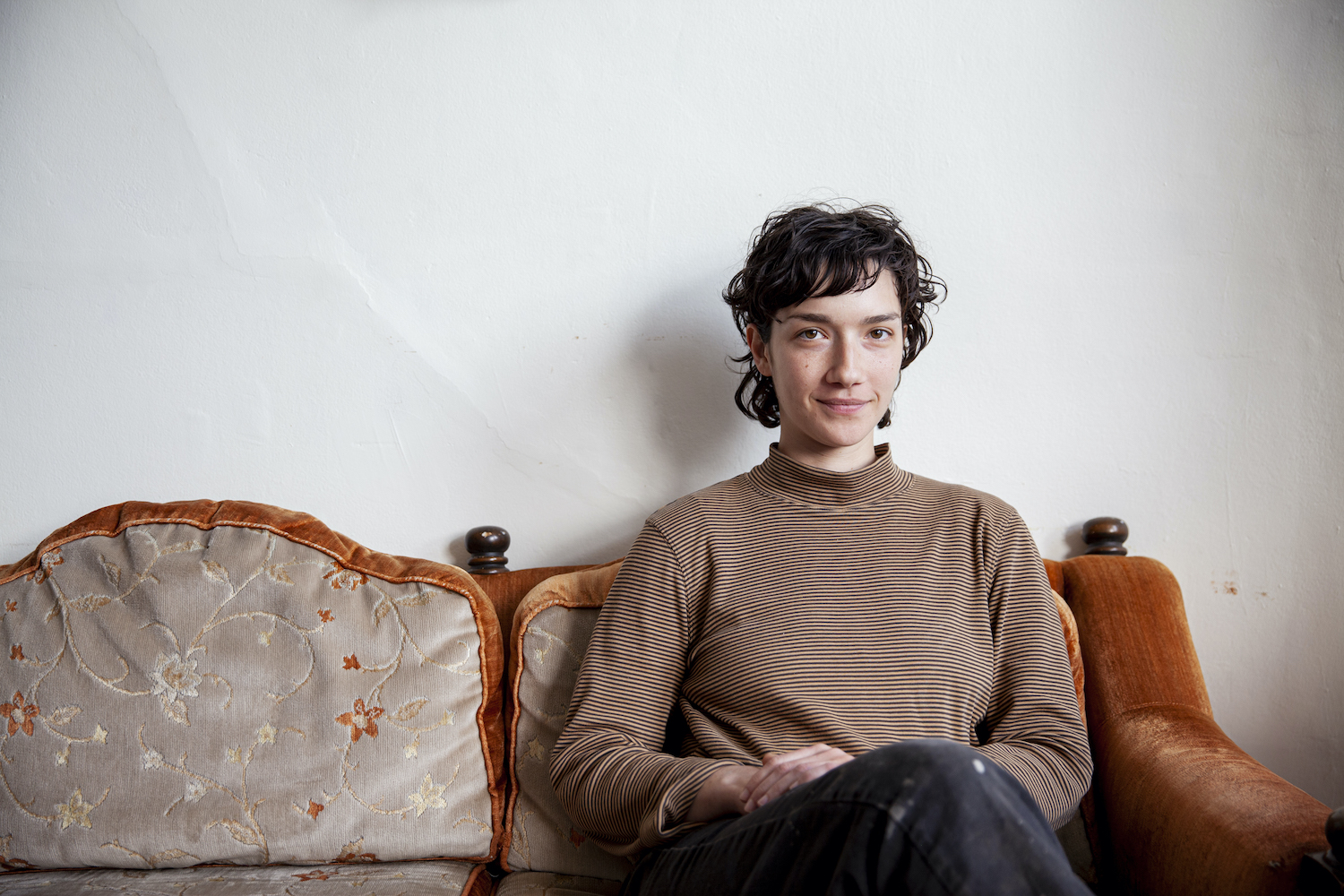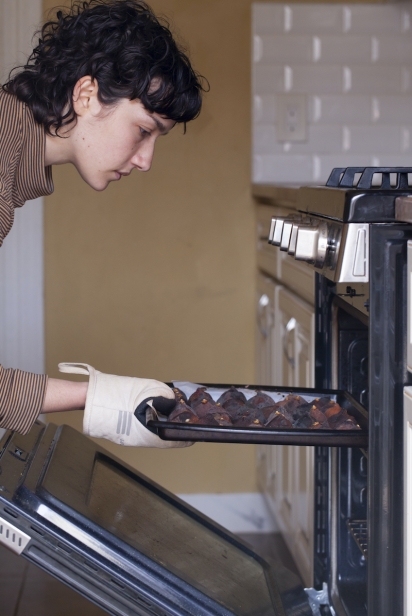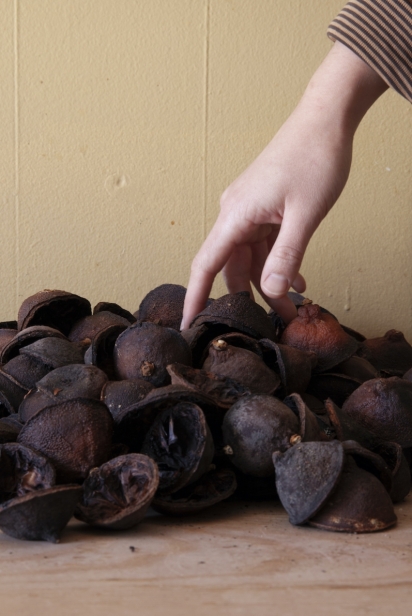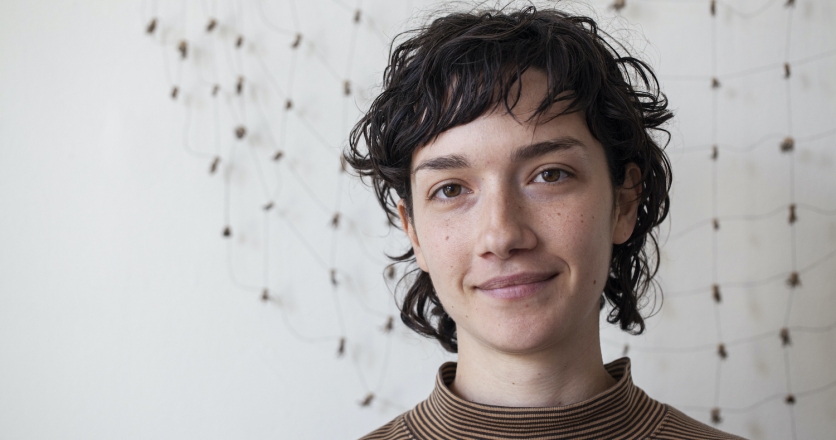The Girl with the Lemon Tattoo
There are well more than 800 lemons in Hannah Berger’s Ridgewood apartment. She pours them out of two cardboard boxes and a hill of them emerges, sweet-smelling and in various states of decay. A visual artist from Florida, Berger’s work with citrus is both nostalgic of her West Palm Beach upbringing (an orange tree in the backyard, sand, etc.) and symbolic of themes like aging and reproductive choice (in the past, women used sponges soaked in lemon juice to prevent pregnancy).
Berger mostly works with found objects—before moving to Ridgewood from Kingston, New York, that meant furniture scraps and disassembled objects. After completing a commission to paint murals at Freehand Hotel in Manhattan, Berger transitioned to working at Norma’s Corner Shoppe, where the lemon hoarding began. She salvaged the citrus after juicing them as part of her prep work at the café, and used them to create art.
We stopped by Berger’s home studio for a pithy chat about her process and very ripe material.
How did you start working at Norma’s?
I came here and was fortunate to immediately have this great mural gig, and that sustained me for a long time. And then I didn’t have anything going on for a bit and was, like—I had service experience and Norma’s is super close. So I started there; and I wasn’t going to stay but I stayed. The people there are wonderful; it’s super convenient. That’s mostly why I stayed for so long (like a year and a half), but it just started to get… you know, customer service jobs are tough.
What kind of art do you make and what themes do you work with?
I work mostly in sculpture, and I work a lot with found material. I would say that my work often takes the shape of abstracted furniture, and I use a lot of pieces of furniture. A new term that I just thought of about my work is that it’s terminally domestic, maybe with the exception of all the citrus stuff. The line it follows is domesticity, and I like for my sculptures to embody human qualities like dependence and longing. I’m a very sensitive and emotional person and I think that just comes through in my work. A criteria for my materials is, like, if I see something on the street and I find it heartbreaking, I pick it up.
What got you interested in working with citrus?
I’m very interested in decay, and that ties into the citrus stuff. I started working with citrus as a common material my last year of college at Bard, and I started thinking of it as working with nostalgia. And as someone from Florida, I was thinking about oranges, and I started using them as a symbolic material for nurturing and being nurtured. I was mostly using desiccated peels but also full oranges and I think I came by the decayed lemon peels kind of just by chance. I let them out in my studio or something and they just dried in this really beautiful way. Just that deepening of the color. I think there’s something really beautiful about that and I think the way that the peels age is kind of what has kept my interest.
I started working at Norma’s; they juice lemons for prep. So I was, like, ‘Oh great; this is free material.’ So I started taking those and [they] had the dual purpose of, one, being material that I can constantly be working with and amassing a collection of, which is exciting, I guess. But also, I think it helped me mitigate how demoralizing a day job can be.
What’s your process? What do you do with the lemons?
I was able to dry them en masse using my oven, which was a great discovery. Just put them in a pan at 250° and it takes, like, a day to do a bag. And I have installed them. I sold them at a group show in Troy last year in a confessional booth along with dried rose petals; and that's kind of the first and only time that I’ve installed my mess in a large group show.
What do the lemons mean to you conceptually?
The thing that I love about lemons is that I think they’re just such rich symbolic agents. And for me, they mean a lot of things. For example, there’s something about specifically the aging process, in which they go from being a very sharp and tart flavored fruit into being these... some kind of softening and richness occurs; I mean physically and literally—they become hard, obviously—the color deepens, and they also give off this really sweet smell which fills my apartment, which I also love. I’m really interested in what that means for me in terms of how that parallels aging as people.
Something I’ve also been thinking about that keeps me going back to lemons specifically is, as a woman, I’ve been feeling some sort of kinship with the sourness. I’ve been fully embracing being rude and allowing myself to be so. There’s something about the unapologetic sourness of lemons that I’m very into. I also think it’s no coincidence that they look like a boob; they’re so beautiful and are little hats. They are very stackable, and I also have been thinking about them as vessels.
Hannah Berger | @hannah_is_gluing
Freehand Hotel | @freehandhotels
Norma’s Corner Shoppe | @norma_ridgewood








